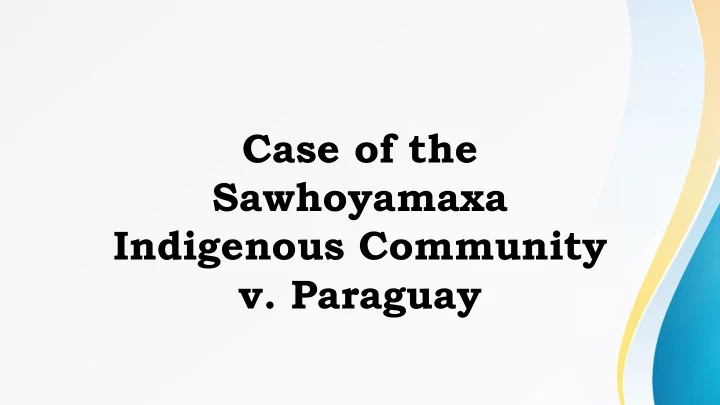

Case of the Sawhoyamaxa Indigenous Community v. Paraguay
Facts • Sawhoyamaxa occupied lands in Paraguay and Chaco • In the late 19 th century, the lands were acquired by British businessmen • The lands were transferred to private owners and divided • Sawhoyamaxa were living in bad condition and they wanted to claim their lands back • https://www.youtube.com/watch?v=_P09v4t49Fo
Legal Issues Did the Paraguay government violate the following articles of the American Convention on Human Rights ? • Article 8 right to fair trial, Article 25 right to judicial protection • Article 21 right to property • Article 4 right to life, Article 19 Rights of the child • Article 3 right to juridical personality
Court Decision The court found violations on all the articles previously mentioned Art. 8 and 25 The Government failed to provide an effective judicial remedy Art. 21 The Government deprived the indigenous community of possession of their land Art. 4 and 19 The Government denied the indigenous community access to its lands Art. 3 The Government failed to register the members of the indigenous community
Legal reasoning Article 21 Right to property • With respect to the right to property under Article 21 of the ACHR, the Court reiterated its previous case law in the Case of the Yakye Axa Indigenous Community and concluded that this provision, interpreted in light of Convention No 169 concerning Indigenous and Tribal Peoples and Independent Countries (27 June 1989) 28 ILM 1382, entered into force 5 September 1991 and domestic laws, provided the Community with the right to claim ownership to its ancestral lands. Conclusions • traditional possession of their lands by indigenous people has equivalent effects to those of a state-granted full property title; • traditional possession entitles indigenous people to demand official recognition and registration of property title; • the members of indigenous peoples who have unwillingly left their traditional lands, or lost possession thereof, maintain property rights thereto, even though they lack legal title, unless the lands have been lawfully transferred to third parties in good faith; and • the members of indigenous peoples who have unwillingly lost possession of their lands, when those lands have been lawfully transferred to innocent third parties, are entitled to restitution thereof or to obtain other lands of equal extension and quality.
Legal reasoning (2) Article 4 Right to Life • In order for the State’s positive obligation to arise, it must be determined that at the moment of the occurrence of the events, the authorities knew or should have known about the existence of a situation posing an immediate and certain risk to the life of an individual or of a group of individuals, and that the necessary measures were not adopted within the scope of their authority which could be reasonably expected to prevent or avoid such risk. Article 3 Right to juridical personality • Article 3 provides that every person has the right to recognition as a person before the law • There has been no registration or official documentation of the existence of several members of the Sawhoyamaxa Community.
Thank you !
Recommend
More recommend